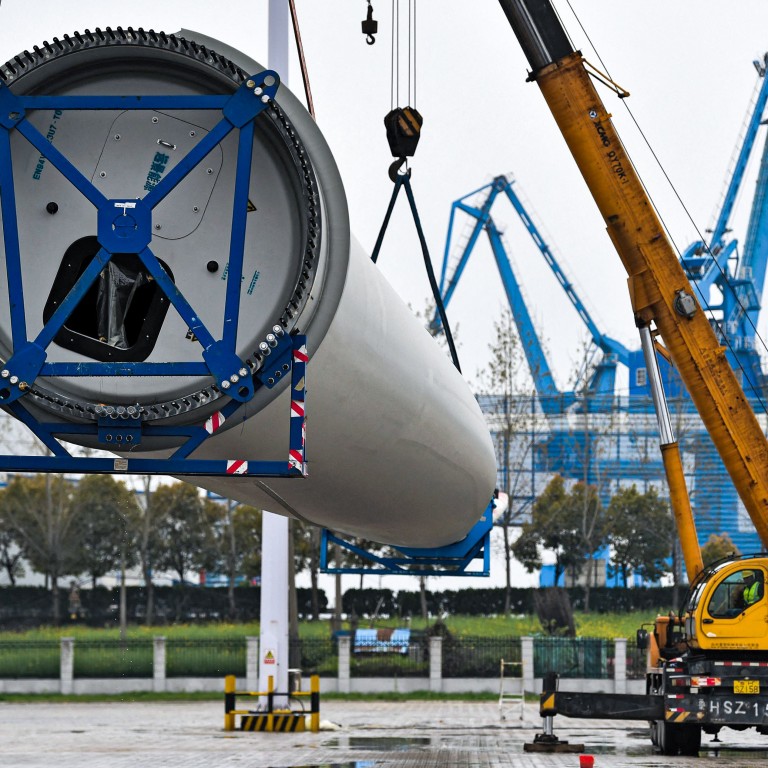
China protests Europe’s new wind-turbine probe and report alleging ‘distortions in the economy’
- State subsidies are in Brussels’ cross hairs as world’s largest windpower producer exports low-cost turbines to quench global demand for clean power
- Move comes as China’s clean-energy space faces overcapacity concerns that have recently garnered more attention in bilateral bickering
Beijing has voiced strong opposition to the European Commission’s plan to investigate Chinese wind turbines over state subsidies and has decried a report from Brussels alleging “distortions in the economy” – developments expected to further strain two-way ties but not deter China in the long run.
The European Commission’s executive vice-president, Margrethe Vestager, said during a speech in the United States on Tuesday that her agency, an operating body for the 27-member European Union, plans to conduct an investigation into subsidies offered for wind turbines in China, according to the commission website.
On Wednesday, the commission’s director for trade defence, Martin Lukas, said via LinkedIn that his agency had published an updated report on “significant state-induced distortions in the economy” in China.
A Chinese Ministry of Commerce official met Lukas the same day in Brussels to rebut both the planned probe and the report, China’s official Xinhua News Agency said.
China’s Li Qiang dismisses ‘overcapacity’ concerns in talks with Janet Yellen
“China believes that the Foreign Subsidies Regulation investigations initiated by the EU so far … have not only severely damaged the confidence of Chinese enterprises in investing and trading in Europe, but also interfered with mutually beneficial industrial cooperation between China and Europe,” the Ministry of Commerce said in a statement on Wednesday.
“The [investigations] will also affect the global response to climate change efforts and the process of green transformation.”
In her Tuesday speech, Vestager said the commission would look into the Chinese suppliers of wind turbines and the “conditions for the development of wind parks” in Bulgaria, France, Greece, Romania and Spain.
Subsidies stand to lower unit prices, making goods more competitive in overseas markets such as Europe.
Also on Tuesday, the commission announced a preliminary anti-dumping ruling on Chinese-made alkyl phosphate esters and imposed a 45.1 per cent levy on the fire-retardant plasticisers.
European leaders had already been fretting over perceived Chinese market-access barriers and trade imbalances. The EU’s trade-in-goods deficit with China was €291 billion (US$312.6 billion) last year, when China was the EU’s largest import source at 20.5 per cent of the total.
China is the world’s largest windpower producer, and it exports turbines to quench global demand for clean power while the domestic clean-energy space faces overcapacity.
China wind turbine investigation may hurt EU’s clean energy projects: analysts
This EU’s 700-page Commission Staff Working Document on economic “distortions” in China updates a 2017 report by summarising recent Chinese legislation and industrial policies. The content is meant to guide any anti-dumping investigations if prices and costs are “affected by significant state-induced distortions”, Lukas said on LinkedIn.
Following the meeting with Lukas in Brussels, the commerce ministry’s statement said: “The EU updated its relevant report and once again distorted China’s policies, market environment and economic system, creating excuses for subsequent discriminatory anti-dumping practices.”
“China expresses great concern and strong opposition,” it added.
And on Thursday, the criticism continued, with ministry spokesman He Yadong saying that the EU’s probe into Chinese wind turbines “obviously violates the principles of free trade and severely disrupts normal bilateral industrial cooperation”.
“It is typical protectionism, which will deal a heavy blow to the global response to climate change and the green transition,” he said, adding that the decision stands to hurt multinationals’ confidence in the EU and “impairs China-EU mutual trust”.
Analysts expect that China will probably respond further, albeit cautiously, to avoid losing too much trade with Europe.
With near-term solutions difficult, China “won’t take these European actions lying down”, said Nick Marro, lead analyst for global trade with the Economist Intelligence Unit. He pointed to China’s subsidy investigation into French brandy, announced in January, as an example of China’s likely reactions going forward.
But China is unlikely to strike unless in direct response to provocations, he said, as “they’re interested in stabilising their ties with Europe”.
Chinese firms may also double down on shipping goods to Europe from third countries if the EU, and China cannot bury their disputes, said Song Seng Wun, an economic adviser at the financial services firm CGS in Singapore.
They could ship to Europe from Vietnam or other developing countries, just as they export now from Mexico to the United States, Song said.
“China can play the long game,” he said. “They can build up that scale, too.”


